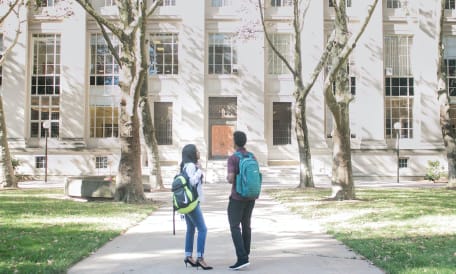Applying to college can be a daunting process, with many students wondering what exactly colleges are looking for in a candidate. Over the years, the criteria for what colleges look for in a candidate have varied and sometimes changed significantly. While there is no one-size-fits-all answer to this question, there are some general traits and qualities that colleges tend to value in their applicants.
For this BrokeScholar article, we’re focusing on at what colleges look for in a candidate these days as well as provide some useful tips for students who are hoping to stand out in the admissions process. Read on to find out the details on what colleges look for in a candidate when a student applies.
Academic Achievement
One of the most important factors that colleges consider when evaluating candidates is academic achievement. This criterion is relatively timeless as earning good grades in high school is typically interpreted by a college as an indicator of how you’ll perform, and equally important, how seriously you’ll take the college’s curriculum. This includes factors like grades, SAT or ACT test scores, and the rigor of the courses that a student has taken. Colleges want to see that applicants have challenged themselves academically and have performed well in their classes.
When evaluating a student's academic achievement, colleges also consider the context in which the student has achieved their grades and test scores. For example, a student who has taken a rigorous course load at a high-performing school may be viewed more favorably than a student who has taken an easier course load at a less competitive school. If you’ve got your grades covered but need help with standardized testing, check out our guide to taking the SATs.
Extracurricular Activities
In addition to academic achievement, colleges also look for candidates who are well-rounded and have a variety of interests and talents. Hence, participation in extracurricular activities, such as sports, clubs, volunteer work, and community service, are important markers for this criterion when colleges evaluate candidates.
Colleges are not necessarily looking for students who have participated in a large number of extracurricular activities, but rather for students who have shown depth of commitment and leadership in their chosen activities. This can include holding leadership positions in clubs or organizations or demonstrating a long-term commitment to a particular cause or activity.
Personal Qualities
Colleges also look for personal qualities in their candidates, such as leadership, initiative, creativity, and intellectual curiosity. These qualities can be demonstrated through a student's essays, letters of recommendation, and other application materials.
Colleges also value candidates who demonstrate resilience and the ability to overcome challenges. This can include overcoming academic or personal obstacles or demonstrating a willingness to take risks and try new things.
Diversity
With the increasing centrality of DEI policies (Diversity, Equity, and Inclusion), colleges have increasingly come to value diversity in their student body, and look for candidates who bring a variety of perspectives and experiences to campus. This can include factors like race, ethnicity, socioeconomic background, and geographic location.
Colleges may also value diversity in terms of a student's interests and talents. For example, a student who is an accomplished musician or artist may be viewed as adding diversity to the student body.
College Application Essays
College application essays are an important part of the college application process, as they allow students to showcase their personality, writing skills, and perspective. Colleges may use essays to learn more about a student's background, goals, interests, and values. Essays can also be used to evaluate a student's writing ability and critical thinking skills.
When writing essays, it's imperative for students to be authentic and honest about their experiences and perspective. They should focus on telling a compelling story that highlights their unique qualities and strengths. Essays should also be well-written and free of errors and should be tailored to the specific school or program that the student is applying to.
Letters of Recommendation
Letters of recommendation can provide valuable insight into a student's character, academic ability, and potential for success in college. Colleges typically require letters of recommendation from teachers, counselors, or other adults who know the student well.
When selecting recommenders, students should choose individuals who can speak to their strengths and achievements, and who can provide specific examples of their work or contributions. It's also important to give recommenders plenty of time to write their letters, and to provide them with any necessary information or materials.
College Interviews
Some colleges may require or offer interviews as part of the application process. Interviews can provide an opportunity for students to showcase their personality, interests, and potential for success in college. They can also provide valuable information about the school or program that the student is applying to.
When preparing for an interview, students should research the school or program ahead of time and prepare thoughtful questions to ask the interviewer. They should also dress professionally and be on time for the interview.
Demonstrated Interest
Lastly, some colleges may consider a student's demonstrated interest in the school when making admissions decisions. This can include factors like attending information sessions, visiting the campus, or contacting admissions officers with questions or concerns.
While demonstrated interest may not be a major factor in admissions decisions, it can help to convey a student's enthusiasm and commitment to the school. Students should consider attending college fairs, visiting campuses, and reaching out to admissions officers to learn more about the schools that they are interested in.
Tips for Standing Out
With so many qualified candidates applying to college each year, it can be challenging to stand out in the admissions process. However, there are some steps that students can take to improve their chances of being admitted to their top-choice schools:
-
Focus on academic achievement: Colleges place a high value on academic achievement, so it's important to take challenging courses and strive for good grades and test scores.
-
Get involved in extracurricular activities: Participation in extracurricular activities can help to demonstrate a student's well-roundedness and commitment to their interests. Students should focus on activities that they are passionate about and can demonstrate leadership and initiative.
-
Develop personal qualities: Students should strive to develop personal qualities like leadership, creativity, and intellectual curiosity. This can be demonstrated through essays, letters of recommendation, and other application materials.
-
Show diversity: Students can demonstrate diversity by highlighting their unique experiences and perspectives, as well as their talents and interests.
-
Be authentic: Finally, it's important for students to be authentic and true to themselves throughout the application process. Colleges value students who are genuine and honest about their accomplishments, interests, and goals.
The Bottom Line on What Colleges Want in a Candidate
While there is no one formula for getting into college, there are some general traits and qualities that colleges value in their applicants. These include academic achievement, extracurricular activities, personal qualities, and diversity. Students can improve their chances of being admitted to their top-choice schools by focusing on these areas, and by being authentic and true to themselves throughout the application process.
It's also important for students to remember that the college admissions process is not just about getting into the "best" school or the most prestigious program. Rather, it's about finding the right fit for each individual student. Students should consider factors like location, size, academic programs, and campus culture when evaluating potential schools, and should focus on finding a school where they will thrive both academically and personally.
Ultimately, the college admissions process is a complex and often unpredictable journey, and there are no guarantees of admission to any particular school. However, by focusing on academic achievement, extracurricular activities, personal qualities, and diversity, and by being authentic and true to themselves throughout the process, students can improve their chances of finding the school that is the best fit for them.

